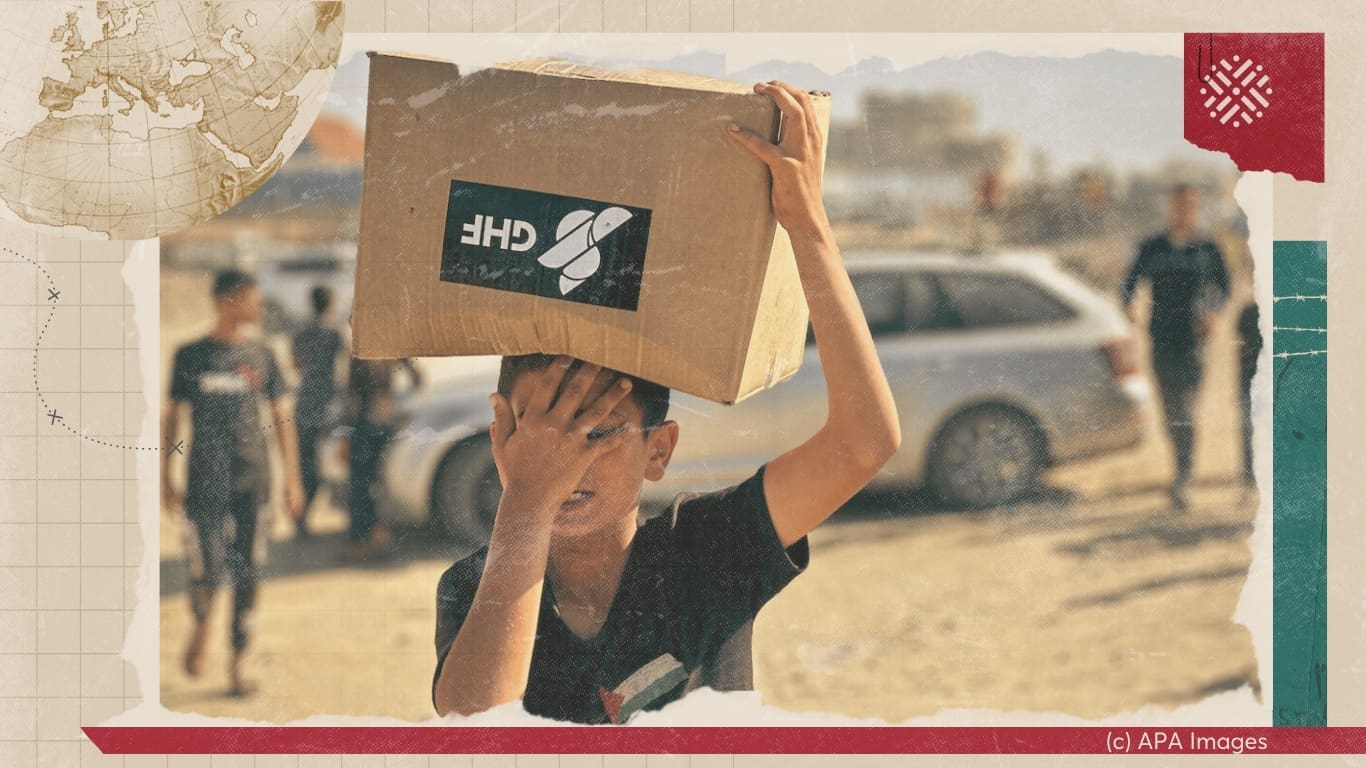
Introduction: An Israeli-US Aid Plan for Gaza
In November 2024, US national security consulting firm Orbis conducted a feasibility study for the Israeli government outlining a new food aid distribution system in Gaza. Funded by an undisclosed philanthropic organization, the study proposed a framework for humanitarian aid distribution managed by private organizations and secured by veteran US military contractors operating in coordination with Israeli occupation forces.1
Indeed, from January to March 2025, US private military contractors operated key checkpoints in Gaza during the first phase of the ceasefire agreement. They were tasked with vehicle inspection and overseeing the movement of displaced Palestinians returning to their homes, particularly at the Netzarim corridor dividing northern and southern Gaza. Safe Reach Solutions (SRS) and UG Solutions are two US-based private security firms that collaborated closely in operating the checkpoints—a move backed by the US, Egypt, Qatar, and the Israeli regime.
In February 2025, the Gaza Humanitarian Foundation (GHF) was established in both Switzerland and the US. According to the Orbis plan, GHF is mandated to cover the cost of the food aid and manage its delivery, while SRS recruits armed security personnel to guard the distribution sites. In this way, the new scheme deliberately sidelines UN bodies and aid organizations that have been working in Gaza for decades. Consequently, the UN has refused to participate in the GHF system due to its failure to adhere to humanitarian principles.
Launched on May 26, 2025, the new aid distribution system has already led to over 100 Palestinian deaths, mostly from Israeli gunfire, as civilians faced perilous conditions at hubs near military posts along the Rafah border. On June 3, Israeli forces opened fire at Palestinians seeking food assistance near a GHF aid distribution site in Rafah, resulting in 27 fatalities and over 90 injuries in a single day. After three consecutive days of fatal shootings at GHF aid hubs, the organization announced a temporary suspension of its operations, only to resume its work shortly afterward despite ongoing safety and security threats faced by Palestinians seeking food. The dangers posed by this new aid model remain pressing and raise serious concerns about the role of US contractors under Israeli oversight.
Privatization as Colonial Strategy
Crucially, the GHF could serve to advance Israel’s plans for ethnic cleansing. According to Philippe Lazzarini, commissioner-general of UNRWA, the Israeli-backed aid delivery model could amount to a war crime by effectively enabling the forced displacement of Palestinians. By restricting aid to select groups and designated distribution zones, this strategy effectively forces people to move to southern Gaza near the Rafah border, where the Israeli regime has stationed the new aid hubs, or risk starvation. Accordingly, this plan constitutes a weaponization of humanitarian aid, violating international legal norms.
The deployment of private contractors to take over the aid delivery structure serves as a tool of demographic and territorial reordering Share on XMeanwhile, Israeli officials have explicitly rejected any role for the Palestinian Authority or Hamas in Gaza’s aid distribution or its future governance. By excluding Palestinian leadership from any future role in Gaza, the new aid plan fulfills Israel’s long-term vision of ethnically cleansing Palestinians. Prime Minister Benjamin Netanyahu’s call to “create a different Gaza” reflects a strategic objective to forcibly displace the Palestinian population, dismantle existing governance structures, and eliminate prospects for the emergence of alternative Palestinian institutions. In this context, the deployment of private contractors to take over the aid delivery structure serves as a tool of demographic and territorial reordering, reconfiguring Gaza’s administrative space into an outsourced extension of Israeli control and occupation.
The growing role of US private contractors, often staffed with military veterans, in Gaza’s security and aid sectors signals a strategic shift in how the Israeli regime is planning to consolidate control over the territory. By outsourcing critical functions to profit-driven foreign entities that operate within frameworks shaped by the Israeli regime, these arrangements erode Palestinian institutions and weaponize humanitarian aid. Indeed, the militarization and privatization of assistance and security in Gaza are not temporary ad hoc features of Israel’s genocidal campaign. Instead, they are integral to a systematic colonial strategy to dismantle Palestinian civilian institutions and reengineer Gaza’s governance landscape into an outsourced extension of Israeli military control, administered through US private contractors.
Recommendations
To resist this attempt to redraw the humanitarian landscape into one that serves the Israeli regime’s colonial plans, international, regional, and local actors who hold direct or indirect influence over Gaza’s governance, humanitarian response, and political future should consider the following recommendations.
- Rebuild and Empower Local Governance Structures
Prioritize aid to Palestinian-led institutions, ensuring it strengthens, rather than circumvents, local governance and security frameworks. Establish mechanisms for meaningful Palestinian involvement in the design, implementation, and oversight of humanitarian efforts.
- Phase Out Foreign Private Contractors
Develop a time-bound plan to phase out foreign private contractors, transferring responsibilities like logistics, aid distribution, and security to accountable Palestinian institutions. Support this transition with targeted international technical and financial assistance to strengthen local capacity.
- Demilitarize Aid and Humanitarian Infrastructure
Reaffirm neutrality, impartiality, and independence of humanitarian assistance systems, and urgently restore UNRWA’s operations as the only body currently equipped to handle large-scale, effective aid delivery in Gaza.
- Support Legal and Political Advocacy for Sovereignty
Reject models that reinforce indirect Israeli control or external administration in Gaza. Defend Palestinian political agency and territorial integrity through international legal and diplomatic action, and resist the normalization of outsourced governance under occupation.
- Tie International Aid to Self-Determination
Condition donor support on firm commitments to Palestinian-led governance and service provision. Aid should advance Palestinian self-determination, not be used for political manipulation or to reinforce occupation and foreign control.
- To read this piece in French please click here. Al-Shabaka is grateful for the efforts by human rights advocates to translate its pieces, but is not responsible for any change in meaning.
Safa Joudeh is a postdoctoral scholar at the Institute of Arab and Islamic Studies, University of Exeter. Her research explores the political economy of China’s port and maritime infrastructure projects under the Belt and Road Initiative (BRI). She focuses on the implications of Chinese infrastructure deployment and industrial capacity cooperation programs for host countries in the Middle East. Safa earned her PhD in Development Studies from SOAS University of London, where she currently serves as a teaching fellow.











